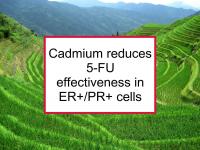Cadmium is a widespread heavy metal pollutant with no known health benefits. Since the body does not readily eliminate it, cadmium accumulates in tissues. The level of cadmium in urine reflects exposure to cadmium over the previous 20 to 30 years. High cadmium levels in breast tissue and urine have been linked to increased rates of BC.
Cadmium is associated with increased breast density, a marker for breast cancer risk. Cadmium exposure has been linked to increased risk of breast cancer in several population studies. Numerous studies have demonstrated that cadmium promotes the growth and proliferation of breast cancer cells. Now a new study has reported that cadmium interferes with the treatment effects of 5-Fluorouracil (5-FU) chemotherapy in hormone receptor positive breast cancer cells.
Latest research finds cadmium blocks 5-FU treatment effects
The study referenced at the beginning of this news article was designed to investigate the influence of cadmium on treatment with 5-FU in hormone receptor positive (ER+/PR+) MCF-7 breast cancer cells. 5-FU is a fluoropyrimidine chemotherapy drug used to treat solid tumors of the colon, stomach, liver, and pancreas, as well as the breast. The authors performed various experiments to examine the effects of cadmium on cell cycle, apoptosis (programmed cell death), and gene and protein expression in MCF-7 cells treated with 5-FU. Cadmium was found to modify the cell cycle profile, significantly suppress apoptosis, and alter the expression of various genes and proteins associated with cancer in ways that blunted the treatment effects of 5-FU. The authors conclude that exposure to cadmium blocks the anticancer effects of 5-FU in MCF-7 cells.
Please see our article on cadmium and breast cancer for more information.
